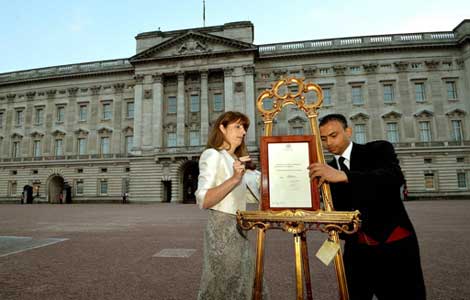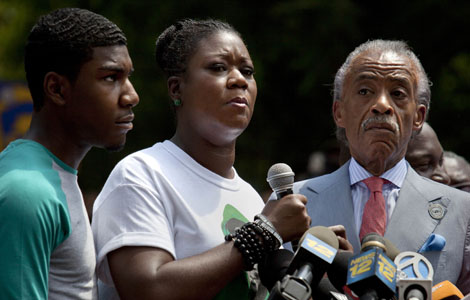Ending a dangerous game
Updated: 2013-07-23 07:31
By Ted Galen Carpenter (China Daily)
|
||||||||
US should change its approach to territorial disputes in East Asia and make its conduct match its statements of neutrality
Washington must exercise great care or the United States could become entangled in an assortment of volatile territorial disputes in East Asia.
Recently, the most prominent and potentially dangerous dispute has been between China and Japan over the Diaoyu Islands in the East China Sea. But disagreements continue to simmer between China and Vietnam and the Philippines, regarding parts of the South China Sea.
The Barack Obama administration insists that the US is neutral regarding all of these disputes, but US actions, especially over the past three years, belie such professions of neutrality. Washington has increasingly become involved, and in every case, US policy has tilted toward any claimant other than China.
That is an unwise course, since it encourages some nations, especially US treaty allies such as Japan and the Philippines, to adopt uncompromising stances and reduces the prospects for compromise solutions. A policy so biased against China also has the potential to poison the US' crucial economic, diplomatic, and strategic relationship with a re-emerging great power in the international system.
Washington needs to change its approach quickly and make US conduct match its statements of neutrality.
Washington's interest in the South China Sea disputes has grown dramatically in recent years. In a July 2010 speech before a meeting of the Association of Southeast Asian Nations, then-Secretary of State Hillary Clinton emphasized that Washington had important interests at stake in the South China Sea and proposed a "collective regional solution" that projected a mediation role for the US.
The visit of then-Secretary of Defense Leon Panetta to Vietnam the following June further highlighted Washington's escalating involvement, as well as a noticeable bias against China's claims. Panetta's underlying goal was to gain access to the harbor at Cam Ranh Bay for US warships. Referring to the so-called US strategic pivot to East Asia, Panetta told reporters that the US would "work with our partners like Vietnam to be able to use harbors like this".
With the South China Sea as a visual backdrop, he added "it is very important that we be able to protect key maritime rights for all nations in the South China Sea". It was probably no coincidence that Hanoi's stance hardened dramatically over the following months.
The "anyone but China" bias in Washington's policy has been evident on other occasions. While attending an economic summit in Bali in November 2011, President Obama went out of his way to highlight the importance of the US defense alliance with the Philippines. His comment followed Clinton's strongly pro-Philippines statements regarding the South China Sea, such as "the United States will always be in the corner of the Philippines".
However Washington's conduct regarding the South China Sea is more inclined toward balance and neutrality compared to its stance regarding the dispute between China and Japan over the Diaoyu Islands. Clinton stated in 2010 that Washington's 1960 defense pact with Japan covers the islands, and Assistant Secretary of State for East Asia Kurt Campbell was equally definitive in September 2012, stating bluntly that the disputed islands were "clearly" covered by the treaty, which obliges the US to come to Japan's aid if attacked. Secretary of State John Kerry reiterated that position in April.
The Obama administration's policy is both contradictory and unhelpful. Even as they apply the defense treaty to the Diaoyu Islands, Kerry and other US officials insist that the US takes no position on the substance of the dispute. But by stating that the mutual security treaty includes the islands, Washington is implicitly regarding the islands as Japanese territory, prejudging the issue.
That view has encouraged the Japanese government and public to be more uncompromising over the dispute. Myopic actions such as the June joint US-Japanese military exercises aimed at improving the amphibious attack capabilities of Japan's Self Defense Forces increase tensions and strengthen Tokyo's belief that it should confront China. It seems hardly coincidental that the government of Prime Minister Shinzo Abe adopted a more militant position once US officials stressed the importance of the alliance with Japan and said that the bilateral defense treaty covers the disputed islands.
Washington is playing a dangerous game by stirring tensions and backing certain parties regarding emotional territorial disagreements. But except for the preservation of navigation rights through the relevant bodies of water, the US does not have important interests at stake in these disputes. Strict neutrality is appropriate for Washington - in deeds as well as words.
The author, senior fellow of defense and foreign policy studies at the Cato Institute based in Washington, is the author of nine books on international issues.
(China Daily USA 07/17/2013 page11)
Most Viewed
Editor's Picks

|

|

|

|

|

|
Today's Top News
Germany to probe spy services' ties with US
Snowden hopes to leave airport by Wednesday
Quake in NW China kills 89, injures 700
US blacks, whites split on Zimmerman verdict: poll
Kissinger and Jiang see bright future for relations
China sees no major forex withdrawal: regulator
Business holds up for Minmetals arm
Beijing knife attack leaves one dead
US Weekly

|

|














